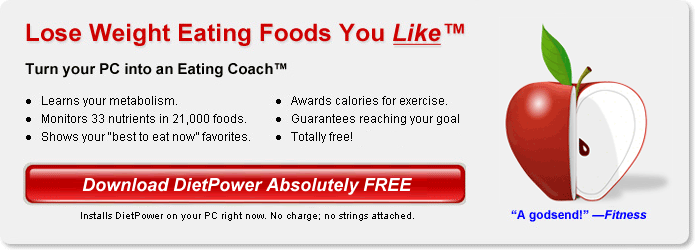

Weight-Loss Software > Fat Calorie Counter
Finding the Best Fat Calorie Counter
By Terry Dunkle, DietPower Editor-In-Chief*
Dieters who really know what they're doing understand that counting fat grams is as important to weight loss as counting calories. One reason: every gram of fat contains nine calories-more than twice the number in a gram of carbohydrate or protein, and nearly 30-percent more than in a gram of alcohol.
Top Fat Calorie Counter
Download it free. (No strings.)Another reason: Getting too many of your calories from fat elevates your risk of heart disease, cancer, diabetes, stroke, and other ailments.
Hence, if you want to feel less hungry on the same number of calories and reduce your health hazards, watching your fat intake is vital.
Tracking Calories via Fat Calorie Counter
Every reputable calorie counter is based on this rule: if you eat 3500 calories less than your body needs, you'll lose one pound.
The only question is, of course, how long you take to lose each pound. Most authorities recommend forgoing less than than 1000 calories a day, meaning you'll lose no more than two pounds per week. A more extreme diet may not provide all the nutrients you need for good health. In addition, pounds that disappear rapdily are more likely to reappear later.
Tracking Fat via Fat Calorie Counter
Make sure the calorie counter you choose not only tracks grams of fat, but also the percentage of your calories that you get from fat. Most nutritionists advise maintaining a percentage under 30. This will ensure lower health risks and less hunger.
Before You Start Using a Fat Calorie Counter...
...make sure it gives you a calorie budget that agrees with the DietPower calorie budget calculator, which is carefully checked for accuracy.
Pick an Easy-to-Use Fat Calorie Counter
Anyone can count fat and calories by tallying figures from food labels. But it's faster and more convenient to use your computer.
You can find many fat calorie coutners on the Web. Some work strictly via the Internet; others can be downloaded and installed on your PC, which provides more privacy. (PC-based programs are also faster, because they don't have to communicate with the Internet every time you log a food.)
A Fat Calorie Counter That Does More
Since you'll be recording all your meals anyway, it pays to choose a program that tracks not only fat grams and calories, but other nutrients (calcium, sodium, protein, folic acid, and such). Many programs also track calories burned in exercise. One popular program, DietPowerŽ, automatically adjusts your calorie budget to changes in your metabolism. It also suggests foods that are best for your personal nutrition.
*Terry Dunkle is a 30-year veteran medical journalist and consumer advocate who serves as CEO and chief editor at DietPower, Inc., a leading maker of nutrition and weight-loss software.
To comment on this page, click here.
|
 Click here to see biographies Click here to see biographies of DietPower's scientific advisory board members. |
SPAM POLICY: DietPower doesn't send emails to people who haven't requested them, nor do we share email adresses with third parties. If you
suspect that someone has subscribed you to our mailing list fraudulently, email us at webmaster@dietpower.com.

